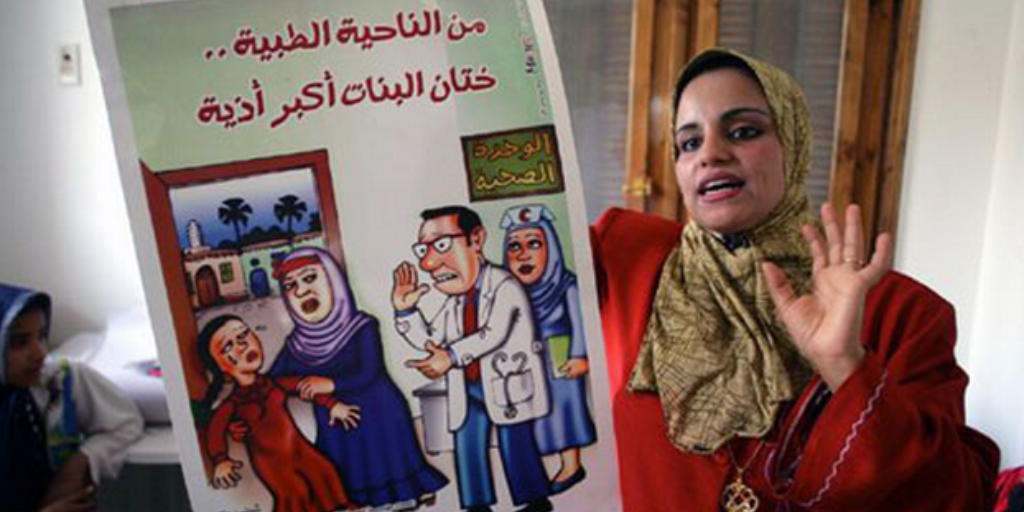The 2015 Egypt Health Issues Survey (EHIS) has found that around 9 in 10 women aged 15-49 have undergone female genital cutting (also known as female genital mutilation) despite a government ban on the practice.
The report is the second time ever a survey has recorded the prevalence of FGM among all Egyptian women aged 15-49. Previous studies focused on the prevalence of the custom among women who had been married or who are married.
FGM, which the 2015 EHIS says have been a tradition in Egypt since the Pharaonic period, remains widespread across Egypt but is expected to decline. For example, seven in 10 women aged 15-19 have been circumcised compared to eight in 10 women aged 20-24. However, for women between the ages of 25-49, the percentage of women who have been circumcised ranges from 89 to 97 percent.
Comparing the results to the 2008 Egypt Demographic and Health Survey (EDHS), there has been a four percent decline in the overall rate of FGM for women aged 15-49.
The study also found differences between rates of FGM depending on whether women lived in rural or urban areas and the level of education they have received. For example, fewer than eight in 10 urban women have undergone female genital cutting compared with more than nine in 10 rural women. Meanwhile, women with no education are most likely to have undergone FGM (98 percent) while women with education and greater wealth are less likely to have been circumcised (70 percent).
Additionally, the study found that virtually all of the women who were surveyed had been circumcised before the age of 15, with half the circumcisions being carried out by traditional birth attendants and 42 percent by trained medical personnel despite the government’s ban.
As for why FGM levels remain high in Egypt, the survey found that many parents believe that female circumcision is required by religion. 59 percent of men agreed that FGM should continue, compared to 54 percent of women.
The 2015 EHIS was conducted on behalf of the Ministry of Health and Population and is part of the DHS Program which is funded by USAID and supported by UNICEF and UNFPA.
History
This is the second report to be released this year on the issue of FGM. In May 2015, Egypt’s Minister of Health announced that 92 percent of married women have undergone female genital mutilation.
Despite a large number of men and women surveyed believing that FGM is condoned by Islam, Egypt’s top Islamic authority has condemned the act as ‘un-Islamic’ and ‘barbaric’. Previous studies have found the phenomenon is not necessarily linked to Islam, with Christian women also having undergone FGM.
Egypt banned FGM in 2008. Article 242 of Egypt’s Penal Code criminalizes the circumcision of girls and the punishment for performing FGM is a prison sentence ranging from three months to two years or a fine of EGP 5,000.
In January 2015, an Egyptian court imprisoned the first doctor ever brought to trial in Egypt on FGM charges that resulted in the death of 13-year-old Sohair al-Bata’a.
The doctor was sentenced to two years in prison with hard labor for manslaughter and three months for performing the banned practice. The doctor also received a fine of EGP 500 (USD 68).
The father of Sohair was also sentenced to three months in prison for FGM.
According to the World Health Organization, Egypt, Somalia, Guinea, Djibouti and Sierra Leone have the highest rates of FGM. A 2013 UNICEF report found that Egypt has the world’s highest total number of FGM sufferers, with 27.2 million women having undergone FGM.






Comments (33)
[…] 90% of Egyptian Women Suffer From Female Genital Cutting Despite Ban – Comparing the results to the 2008 Egypt Demographic and Health Survey (EDHS), there has been a four percent decline in the overall rate of FGM for women aged 15-49. The study also found differences between rates … […]
[…] 90% of Egyptian Women Suffer From Female Genital Cutting Despite Ban – Comparing the results to the 2008 Egypt Demographic and Health Survey (EDHS), there has been a four percent decline in the overall rate of FGM for women aged 15-49. The study also found differences between rates … […]